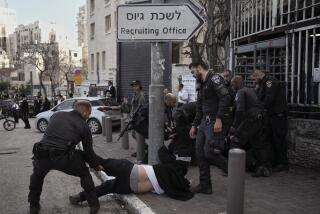Ruling Strengthens Yeltsin’s Hand in Vote : Russia: Top court’s surprise decision means president won’t need majority of whole electorate to endorse him and his reform policies.
MOSCOW — Russia’s top court Wednesday brightened President Boris N. Yeltsin’s chances of winning a clear-cut vote of confidence in Sunday’s nationwide referendum by ruling that Yeltsin needs approval of only a majority of voters actually casting ballots.
The Constitutional Court’s unanimous decision invalidated the tougher, and probably unattainable, standard set by the Congress of People’s Deputies. This would have required the president to win endorsement from more than half of all the 106 million registered voters.
Yeltsin, who won a five-year term in June, 1991, as Russia’s first democratically elected leader, had sought the referendum to settle a power struggle with the more conservative, Soviet-era Parliament over his radical free-market reforms. But the Parliament ordered that four questions should be asked of the public.
While the court made it more likely the president could win an endorsement for himself and his policies, it issued a second ruling that made it less likely he could win a sweep on all four issues.
The surprise ruling in his favor applied to the first two referendum questions: “Do you have confidence in President Yeltsin?” and “Do you approve the government’s social and economic policies since 1992?” The court ruled that such questions of confidence require only a majority of those voters turning out.
But in a separate decision, the court went against his effort to force lawmakers out before their five-year term expires in 1995.
By a vote of 8 to 5, the judges upheld Parliament’s decision that the other two referendum proposals--early elections for the presidency and for the legislative branch--needed support from more than half of the entire electorate. The court majority ruled that the tougher standard applied because new elections are constitutional issues.
The 62-year-old president kept a low profile Wednesday, briefly appearing backstage at an outdoor rock concert staged to encourage a pro-Yeltsin vote. His supporters welcomed the court ruling and said Yeltsin would interpret a referendum victory as a mandate to wield his powers more forcefully.
“This means the advancement of a new constitution,” said Yeltsin legal adviser Sergei M. Shakhrai. “There will be decrees. There will be government resolutions. Probably he will use his right of legislative initiative.”
One member of the court, Boris S. Ebzeyev, warned the president against exceeding his much-disputed authority.
“Even if Yeltsin gets 99.9% of the vote, that won’t give him any more powers than exist in the constitution,” Ebzeyev said at a news conference after the ruling.
Opposition politicians said they accepted the decision but promised no letup in resisting Yeltsin’s Western-aided efforts to dismantle seven decades of Communist central planning and link Russia’s economy to the world market.
Parliament Chairman Ruslan I. Khasbulatov announced before the ruling that, even if Yeltsin achieves a vote of confidence, lawmakers would nullify each post-referendum presidential decree with one of their own, prolonging the crisis that has paralyzed Russian politics for months.
Yeltsin won 60% of the votes cast in a six-man presidential field in 1991, but that was just 42% of the electorate. While Yeltsin is still Russia’s most popular politician, his ratings have suffered with his reforms, which are stalled by high inflation and resistance from Soviet-era factory managers with clout in Parliament.
Polling is relatively new in Russia and virtually untested on a national scale. Most experts say a vote of confidence by a majority of those casting ballots is an attainable goal for Yeltsin, but not a certainty.
Recent opinion surveys by Russian polling organizations in Moscow indicate at least 70% of the voters will participate in the referendum and that as many as 60% of those intending to vote will support Yeltsin, but only about 35% will endorse his economic policies.
Voter apathy is considered to be greater outside the capital, and the prospect of a relatively low overall turnout makes it unlikely that either Yeltsin or the more unpopular Parliament will be forced into early elections.
Yeltsin last week offered to resign if he gets less than half the ballots in the confidence vote Sunday and if the legislature escapes early elections.
The 13-member court’s ruling on the vote of confidence was a straightforward application of an unambiguous law. Still, it came as a surprise because the judges have sided consistently with Parliament in recent decisions.
The ruling buoyed spirits at Wednesday night’s pro-Yeltsin march and rock concert, which drew at least 20,000 young Muscovites to a bandstand outside the Kremlin walls. There the president handed out “Defense of the Motherland” medals to leather-jacketed rock musicians who had entertained the crowds that helped him resist a hard-line Communist coup attempt in August, 1991.
More to Read
Sign up for Essential California
The most important California stories and recommendations in your inbox every morning.
You may occasionally receive promotional content from the Los Angeles Times.










